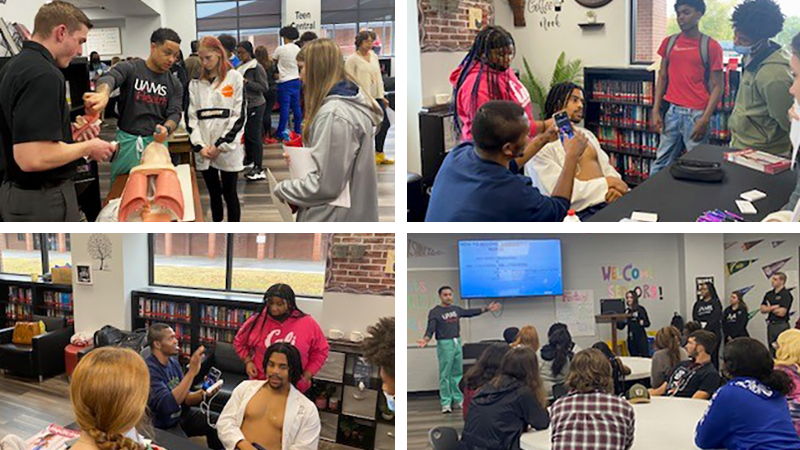UAMS Event Encourages Students in Delta to Pursue Health Careers
| Students from the University of Arkansas for Medical Sciences (UAMS) gathered at Barton High School in Phillips County for an annual event that encourages high school students from the Arkansas Delta to pursue careers in health care.
The Raising Exposure and Awareness of Careers in Health (REACH) session marked a return to in-person community outreach after the event was held virtually for two years because of the COVID-19 pandemic. The UAMS Edith Irby Jones Chapter of the Student National Medical Association (SNMA) sponsors the event with support from the UAMS Division for Diversity, Equity and Inclusion (DDEI).
About 100 juniors and seniors from Barton High School attended the event, which featured presentations by UAMS College of Medicine students who described their personal journeys to medical school. Recruiting specialists from several UAMS Regional Campuses also spoke about health careers and the opportunities available through the campuses’ pipeline programs.
“This engagement with high school students was impactful for both our current student population and our future population,” said Renisha Ward, director of outreach programs in DDEI.
The event also gave high school students the chance to take part in simulated medical procedures. They learned how to conduct ultrasound examinations of the heart, kidneys and lungs. Nurse anesthesia students from the UAMS College of Nursing demonstrated intubation techniques on a manikin, and College of Pharmacy students showed how medications are dispensed.
Evan Hicks, a Delta native who chaired the event for SNMA, welcomed the opportunity to offer encouragement for youths who are interested in health careers.
“Many children in the Delta region have not met health professionals who look like them,” he said. “These children often don’t know what they can do with a passion for knowledge and a desire to help people. An event like this shows high school students that health careers are attainable.”
The Arkansas Delta is among the lowest-ranking regions of the country in many health statistics, said Gloria Richard-Davis, M.D., MBA, executive director of DDEI. Residents are disproportionately affected by heart disease, cancer, strokes, obesity, diabetes and hypertension. Additionally, a lack of health providers in the region makes it difficult to manage chronic diseases or receive preventive care.
“That’s why it is crucial that we train health care professionals who live in the Delta,” Richard-Davis said. “Statistically, students from the area are more likely to return after their medical training and help improve the health of their communities.”
The event was organized by Hicks and by Quincy Gragg, president of the Edith Irby Jones Chapter of SNMA. They collaborated with UAMS students from the Student National Pharmacy Association and from the Nurse Anesthesia program.
The Student National Medical Association and the Student National Pharmacy Association focus on increasing the number of health care professionals who are members of underrepresented groups.
